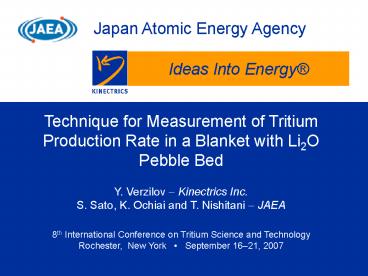Financial Results - PowerPoint PPT Presentation
1 / 16
Title:
Financial Results
Description:
8th International Conference on Tritium Science and Technology Rochester, New ... Tritium labile fraction, which goes into the solution. during detector dissolution ... – PowerPoint PPT presentation
Number of Views:20
Avg rating:3.0/5.0
Title: Financial Results
1
Japan Atomic Energy Agency
Ideas Into Energy
Technique for Measurement of Tritium Production
Rate in a Blanket with Li2O Pebble Bed Y.
Verzilov ? Kinectrics Inc. S. Sato, K. Ochiai and
T. Nishitani ? JAEA 8th International
Conference on Tritium Science and Technology
Rochester, New York September
1621, 2007
2
Kinectrics Inc.
800 Kipling Avenue, Toronto, Canada www.kinectric
s.com
- Applications of Tritium Technologies
- Monitoring and control
- System design for tritium removal emissions
management - Cryogenic distillation systems for fusion
studies - Waste management
3
Contents
I Background objectives II Experimental
techniques a) Treatment procedure b)
Verification tests and determination limit c)
Uncertainties in 3H production rate
measurements d) Indirect technique III Example
of the method application in the blanket
experiment with pebble bed a) Direct
measurements b) Indirect (model reaction)
measurements IV Conclusions
4
Concept of DEMO Blanket Module
Neutron multiplier (Be) pebble bed
Tritium breeder pebble bed
- Tritium breeding ratio is critical issue for
blanket design - Design margin requires highly accurate
calculation - Verification of tritium production requires
integral experiments on the blanket mock-ups.
5
Verification of Tritium Production
Blanket mock-up F82H / Be / Li / H2O
D-T Neutron source
Tritium production rate (TPR) 3H
Activity/Neutron N
Diagnostic Li-detectors inside the Breeder layer
- Requirements for TPR measurements
- Accuracy 5
- Sensitivity 10 Bq/g
- Spatial distribution
- Minimizing perturbation of the thermal neutron
field.
6
Direct Technique for Measurement of TPR
Principle Combination of the binary solvent and
the liquid organic cocktail
Mixture of strong weak acids, HNO3
CH3COOH
Scintillation cocktail containing surfactant,
Clear-Sol
Advantages High solubility Procedure
Simplification of the extraction procedure
Add liquid cocktail containing 16cc of Clear-Sol
Dissolution of 1g Li2O pebbles in 3.4 ml HNO3
1.3 ml CH3COOH
All pellet pretreatment procedures are carried
out in the scintillation vial
All pellet pretreatment procedures are carried
out in the scintillation vial
7
Validation Procedure for Direct Technique
- Factors affecting TPR measurement were studied
for Li2O pebbles - Tritium releases from the pebbles during and
after irradiation - Tritium labile fraction, which goes into the
solution during detector dissolution - Systematic errors, which can exist in the
detectors dissolving and counting
procedures.
8
Validation Procedure for Direct Technique
- Study used detectors with a well-known 3H
activity - Fields where detectors were irradiated
- Thermal neutrons in the cavity of the beryllium
pile - D-T neutrons around the point source.
9
Uncertainties Limits in TPR Measurements
- Determination limit
- 3 Bq/g
- Detector weight 1.3 g
- Measuring time 100 min
- Background rate 10 cpm
- Counting efficiency 22
- Insignificant fraction of 3H can be lost due
to - Escape factor
- Gaseous tritium phase
Best Condition
Conservative Condition
10
Indirect Technique for Measurement of TPR
Basic idea Utilization of 32P activity
measurements, which are produced from the model
reactions 31P(n,g)32P
6Li(n,a)3H
35Cl(n,a)32P or 32S(n,p)32P
7Li(n,na)3H
32P measurement Cherenkov radiation counting
Dissolution in 18 cc H2O
NH4PH2O2 CH3SO2CH3
11
Integral Experiment on the Blanket Mock-up
Layer with Li2O pebble bed
Detectors
Layer of Be blocks
- Measured Reaction Rates
- 93Nb(n,2n)92mNb 32S(n,p)32P 31P(n,g)32P
- 7Li(n,na)3H 6Li(n,a)3H
Li2O pebbles (Ø 1 mm, 78TD, packing fraction
60)
12
Experimental Results for Li2O Pebble Layer
TPR-6, 1/6Li nucl./s.n.
Li2O (15) / Be (100)
Ratio C/E
13
Experimental Results for Be Layers
Be
Li2O
Ratio C/E
14
Experimental Results for Be Layers
Li2O
Be
Ratio of direct to model reaction, relevant to
the 3H production
15
Conclusions
- New direct and indirect techniques led to
successful tests for blanket experiments with
breeder pebble bed. - Technique resulted in TPR distribution
measurements with good spatial resolution and a
minimal thermal neutron flux perturbation - Direct technique allows measurement of tritium
activity in diagnostic detectors at a level of 3
Bq/g.
16
Conclusions contd
- TPR can be evaluated with an accuracy as high as
6 - Indirect technique based on two model reactions
yielded data that simulate the direct process
tritium production on Li isotopes - Direct technique Best for precise measurements
of TPR. - Indirect technique Suitable for verification of
neutron transport issue. - __________________________________________________































